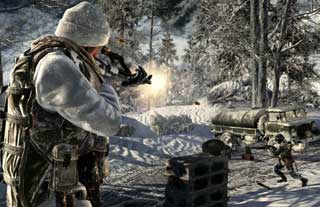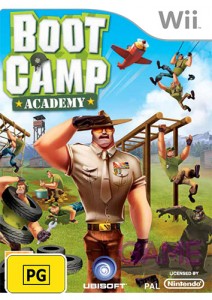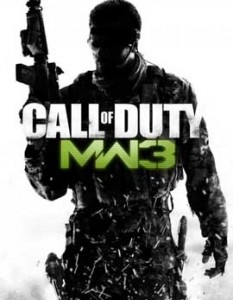Tis fall, that sublime liminal season when a young man’s fancy lightly turns to thoughts of pwning. Just as the summer is glutted with popcorn movies, video game developers tend to launch their “AAA” titles in Oct-Nov. (Even in these days when videogames are played more and more by adults, people tend to buy a ton of them as Christmas gifts.) And the biggest video games of all are first-person shooters. Call of Duty: Black Ops hit shelves last November 9. Within five days, it grossed over $650 million. After a month, it was over a billion. In other words, Avatar is no longer the highest-grossing Sam Worthington project (at least domestically).
These AAA first person shooters have spare-no-expense single player story modes. Black Ops was co-written by David Goyer, a screenwriter who worked on Batman Begins and The Dark Knight. The score was written by Hans Zimmer. In addition to Sam Worthington, you also step into the shoes of Gary Oldman and Ed Harris. These single player “campaigns” are probably my favorite things to do on my Xbox. Each mission is like a tiny Michael Bay film. The second level of Modern Warfare 2, which I still replay often, starts with you scaling a wall of ice. You infiltrate a Russian base, sneaking past the guards and picking off stragglers. Then all hell breaks loose, and you’re mowing down dozens of enemies while sprinting across a burning runway. Then you’re off on a breakneck snowmobile chase through the woods, bullets clipping the trees around you. Finally, you accelerate down a steep hill and jump over a huge chasm, skidding to a stop at the helicopter on the other side. All this takes about 15 minutes, and it’s a total rush.
But after the first week of release, it seems like no one besides me cares about the story. After all, it only takes about 10 hours to complete, max. What keeps people playing is online multiplayer.

The gentleman has found someone to shoot at. That's better than I usually do.
First person shooters allow you to compete online with friends and strangers, across many modes and many maps. For a lot of gamers, multiplayer is practically a part-time job. In the first 45 days that Black Ops was released, players logged over 600 million hours.
Even though I like the single player stuff, it gets old after a while, and competing against real people sounds like fun. But imagine if the first time you wanted to try basketball, they just threw you out on the court with the next nine people in the world who happened to be in the mood for a game that second. Some of them might have logged hundreds of hours on the court. Some of them might practice together every day. All of them would be better than you. Also, they are all wearing special basketball equipment, and you’re in your street clothes.
You would not score many baskets, you would not have much fun, and you wouldn’t make very many new friends. You might not feel like playing basketball again anytime soon.
That, in a nutshell, has been my experience with the multiplayer mode of first person shooters. I get placed into random games with people who have every square inch of these maps memorized. I take ten steps, then get sniped. I respawn, take another ten steps, then get lit on fire. I can see my team is trying to do something, but I’m not sure what I can do to help. Even when I manage to meet an enemy in a fair fight, I’m usually too slow to pick them off.
Think about how a single player campaign is put together. Designers spent months trying to minimize frustration while maximizing fun. One of my favorite descriptions of this process was in Wired magazine, many years back.
The room we’re monitoring is wired with video cameras that Pagulayan can swivel around to record the player’s expressions or see which buttons they’re pressing on the controller. Every moment of onscreen action is being digitally recorded.
Midway through the first level, his test subject stumbles into an area cluttered with boxes, where aliens — chattering little Grunts and howling, towering Brutes — quickly surround her. She’s butchered in about 15 seconds. She keeps plowing back into the same battle but gets killed over and over again.
“Here’s the problem,” Pagulayan mutters, motioning to a computer monitor that shows us the game from the player’s perspective. He points to a bunch of grenades lying on the ground. She ought to be picking those up and using them, he says, but the grenades aren’t visible enough. “There’s a million of them, but she just missed them, dammit. She charged right in.” He shakes his head. “That’s not acceptable.”

Contra has some nice flow. The challenge ramps up gradually, and the enemies attack in the same way everytime. If there was a multiplayer mode where you fought other Contra wearing a whole rainbow of pant colors, it would be a VERY different experience.
Game designers do not want their games to be boring, but they also don’t want them to be frustrating. They want their players in the “flow state,” constantly challenged but never overwhelmed. The game’s difficulty increases gradually from stage to stage, so you seldom hit a section that’s suddenly way beyond your abilities. And crucially, the enemies in a first person shooter will always attack in the same spots, in the same way. So each time you get killed, you learn something valuable about what to try next time. Eventually, you memorize the level, and you’re anticipating the enemies before they walk through the door.
Multiplayer, on the other hand, is unpredictable and unforgiving. You’re at a distinct disadvantage, because everyone else knows all the maps and strategies that will take you many hours to pick up by osmosis. Your opponents will not go easy on you because it’s your first time. They may target you even more once they realize you have no idea what you’re doing. And of course, there are the “perks.” As you play round after round, you earn points which you can then use to upgrade your character. For example, veteran players may not appear on your radar, but you appear on theirs. They might have weapons you don’t have. Maybe they can plant explosives, and you can’t. They might even be able to call in a plane to drop napalm on you. These perks are, of course, meant to be an incentive to keep playing. For me, it just feels like an impossible learning curve for the new guy.
In a way, the multiplayer mode of these shooters makes for a TERRIBLE game, because the difficulty curve is the exact opposite of what you want it to be. It’s the most frustrating right when you start. It’s hard for me to reconcile this with these games’ insane popularity, but I’d say it has to do a lot with social pressures. There are a lot of peer groups in which first person shooters are an important bonding activity. If all your friends are playing these games, the learning curve is worth climbing. It’s a lot like golf, actually. That’s another game that seems absolutely impossible the first time you try it (not to mention very expensive). But golf happens to be a great game to play with friends or business associates. Depending on who you are, your peer group might expect it, and so a surprising amount of people put in the hours to learn to hit a golf ball.

I searched for "video game boot camp," and I found this. Who thought this was a good idea? "Hey, you know what children think is really fun? Infantry basic training! Let's turn that into a video game!" Although if they got R. Lee Ermey involved, then I'm totally buying this.
But here’s a revelation I had recently: no one expects to get good at golf practicing on their own. You need a lesson to get you started. You need a teacher to show you the basics. You get a native speaker to teach you a new language. You meet with a personal trainer to set up an exercise plan. You sign up for a cooking class if you want to learn why your soufflés keep falling. After a couple of lessons, maybe you’ll be ready to practice on your own, perhaps setting up future sessions if you hit a wall and want to bring your skills to the next level. Sure, you COULD figure out these things on your own, but it will take longer, and you’ll probably learn some bad habits.
The idea of hiring a video game coach seems strange, but how is it different than hiring a tennis coach to help you with your serve? If you happen to play Call of Duty instead of tennis, I don’t see why you shouldn’t get a little advice from an expert. I want someone to come over to my apartment and help me power through the most overwhelming part of the learning curve. This person will show me the maps and their secret hiding places. He’ll (I’m assuming it will be a he) introduce me to each mode, and dominant strategies for each. He’ll help me pick equipment and perks that make sense for me. And he’ll play alongside me in live matches, so I can follow in his footsteps and see how it’s done. Here’s who I’m looking for:
- The applicant must play on the Xbox platform.
- He must hold a Prestige-level rank in either Modern Warfare 3 or Black Ops
- He must be willing to travel to New York’s Upper East Side
- He must be comfortable with me blogging about this experiment (I’m willing to change names to protect the innocent)
- For legal and weirdness reasons, I would really prefer that this person not be in high school
Multiplayer is always going to be really hard, and I will never be remotely good at it. But I want to at least figure out what the hell is going on, so I can find out how bad I really am. For that, I need a personal trainer, and I will pay this person for a few lessons (rate TBD). Who’s interested?


If that same person of willing to travel to LA (on thier own dime) give them my info. Your experience with these games is exactly the same as mine.
Way back when, I played the quake games and was never a master, but at least got to the point where I knew what I was doing. But that was using a mouse and a keyboard which is much more precise.
Now, I’m just like you. I heard how popular the shooters were and picked up COD MW2. That single player was TERRIFIC. Like being in a movie, jacked on adrenaline. But I gave up on single player after getting killed hundreds of times while only racking up 3 kills. I see my online buddies from madden logging hundreds of hours on COD or SOCOM but I can’t get to the point where it’s fun instead of frustrating. Ironically, madden is the same way to some of them. They would have to lose 100 online games just to learn the strategies for online play.
I’ve always played the Call of Duty games since they debuted on the PC, and mainly for the story modes. I love campaigns in those games. I used to spend all my time on that while my friends were shouting like maniacs at each other in multiplayer.
I still buy them, play the campaign and jump online eventually to try it. I’m average at best but I still rack up more deaths than victories. I think these games, for the casual shooting fan, can be fun if you’re in the mood to shoot something for an hour or two. I know going into multiplayer that I haven’t logged enough hours to ever prestige but I try to just have fun. It can be frustrating getting killed over and over, but that’s when I turn on something else like Mass Effect.
I used to play a lot of Counter Strike with the same results. Sometimes, I focus on one task like getting kills with a certain gun, or mastering grenades. That way, I don’t get too pissed about dying over and over.
On first glance, I thought this post would be about fitness trainers, and I was going to suggest EA Sports’ Active. http://www.zapsgaming.co.za/45066-31405-thickbox/ps3-ea-sports-active-2-ea5030930091798.jpg
Team Fortress 2 has an online coaching system very similar to what you’re asking for. Of course since its online only, hilarity often ensues.
http://wiki.teamfortress.com/wiki/Coaching
Doubtful that something like this would ever be implemented in Modern Warfare or Battlefield but that’s what dreams are for.
That sounds like a great idea! Is it just me, or does Valve do almost everything better than everybody else?
Valve is a company that cares deeply about games who’s funding no long comes from making game, but from Steam, their game development platform. As a result, Valve is under absolutely no pressure from publishers and has complete control over their products. Pairing this with the staggering income they have from Steam results in incredibly talented and passionate teams that are in a perfect environment to get things right.
So yes, Valve does everything better than everybody else.
This exists, but is much more common in PC gaming than in console gaming. In Starcraft, people routinely pay +$100 an hour for coaching from the world’s top players.
The reason, of course, is the travel – none of these coaches really want to come to your house. So it’s harder to do it for consoles, which have fewer remote working options.
But on a PC, you can Skype in a coach who either watches a video feed of your screen or just railbirds the match on whatever game server you’re using, and you get real-time feedback and guidance on what to practice. They can also bring up other websites or charts or guides, and you can easily write stuff down and things of that nature.
You can watch coaching sessions on twitch.tv – players who have running streams often also stream their coaching sessions – although they aren’t as popular as other stuff most of the time.
This is of course in addition to the tons and tons of instructional videos for high-level gameplay that get published on YouTube and other sites every single day.
Also, one thing that improves this experience is improved automatic rating and matchmaking. If you have enough players and a robust ratings system, you can match players of roughly equal skill level.
I know I sound like a broken record, but Starcraft II does this very well – you used to have to worry a lot more about being noobstomped, but now after the first five to ten games you’re generally playing against people you will beat roughly half the time, and the number of times you just get _crushed_ is much diminished.
I think I could totally benefit from online coaching. But to start off, I think it would be nice to meet someone in person. You can easily play online with a coach, but if you want to customize your character with weapons and scopes and all that, it’s probably easier to do while looking at the same screen.
The ranking system makes a lot of sense, and I’m surprised that Call of Duty doesn’t do that by default. I can’t imagine all the veterans enjoy getting put on a team with noobs like me, and I certainly don’t like getting stalked by a helicopter.
Aren’t strategy-guides a non-personalized version of this?
Why the discrimination, Matt? What do you have against female trainers?
I’ve got nothing against female trainers. But on my list of “Professions That Are Dominated By Men,” Call of Duty Personal Trainer is pretty high up there.
I tried to get my fiance into it, but I think the part where you kill attack dogs with your bare hands sort of ruined it for her.
Every time a zombie dog yelps when I shoot it while my mom is in the room, she gets upset at me.
And by “in the room,” I mean, like, the living room…
You hit the nail on the head, Matt. I find breaking that barrier and getting to the point where I can enjoy myself far too distant from me. Even when I’m playing with friends, I get squashed a lot.
I always wonder, though, and my friends can never articulate it for me. How do the people that do get past that learning curve get there? How do they keep that frustration from getting the best of them? Are there certain characteristics or personality traits that make having the patience for that easy for them? I mean, I have enough patience for some rather unique stuff and life situations, and I typically am a rather gentle, passive pushover that wouldn’t hurt a fly (although a spider, mayhap, but more out of reactionary fear), but I find myself actually doing violent things like toss the controller or punch my couch or a pillow when I’m getting smashed enough in a video game. So I wonder how some people are able to get past that, while others (i.e. myself) aren’t.
Because I’d totally like to play online multiplayer games. I mean, Dead Island has a multiplayer mode.
Aha! Finally I have the opportunity to take my training ability across the pond to the Americans! I have already schooled at least 3 players in the art of Modern Warfare 2’s multiplayer system and they’ve progressed quite rapidly since. In fact, I’d be willing to bring the entire team (3 simple blokes from random areas of the UK) along to help you learn.
As I reside in Glasgow and I am more or less poor all the time, I’m afraid I would have to help you over the headset. Don’t worry about the whole time difference issue, though, Matt – I work night shifts so I’m pretty much awake at the same time as the majority of people in the Eastern time zone. That won’t be an issue. And I have a fantastic connection that hasn’t let me down yet when playing with Americans.
I’ve got a nifty 2.30 kill/death ratio and I’m Prestige 7 (because I like to hold back for a month or so on prestiging at a time) so I have the relevant skills. I will, primarily, be teaching you the art of Team Deathmatch and Free For All as I have little time for objective based games (unless it’s Halo!) and prefer to just shoot motherf*ckers like it’s cool. I pretty much play MW2 for at least three or four hours a week at this point – which is ridiculous I know – so I’m used to the ever-changing capability of the average player.
Curriculum:-
+ Predicting the actions of other players
+ Movement and positioning: where, when, how and why
+ Weaker weapons vs stronger weapons
+ Patience and perseverence
+ The Do’s and Don’ts of Sniping
+ Maneouvreability: jumping, sprinting, diving and prone
+ Using cover appropriately
+ Choosing the right class (perks/weps) per map type
+ Killstreak combinations
Timeframe:-
+ 4 Weeks (1 month)
+ 2 Nights per Week
+ 2 Hours per Night
I hope you don’t mind the sound of a grizzled Scottish accent but just try and imagine that I am a younger version of Sean Connery in Highlander and we will occasionally pause to shout “THERE CAN ONLY BE ONE” during matches when you have managed to land yourself a kill. I ask only that you listen to what I have to say and take notes whenever I prompt you to do so in order to remember what we have covered each night.
Feel free to email me or add me on Xbox Live at MrNeil20
(Yep…I’m deadly serious about this…)
Oh yeah, uh, I meant to clarify a few things.
1.) I am not in high school. I’m 23 years old and allegedly can be considered a functional, tax-paying adult.
2.) I don’t require a fee and wouldn’t dare ask considering that I can’t travel to New York and I’m sure there are applicants who CAN travel there.
3.) I love the idea of you blogging about the experiment (if you choose me) but I’d equally love the opportunity to post my observations about YOUR learning experience
A brief update: I accepted Mr. Neil’s gracious invitation, and we had our first training session last night. Neil and I managed to clear a few of the Spec Ops missions (versus the computer) on the hardest difficulty level. Then we switched to multiplayer (versus real people) and I got 1 kill and 11 deaths. So there’s nothing wrong with my thumbs, but I’ve got a lot to learn.